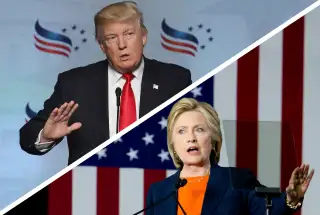Sorry America, Trump and Clinton Don't Want Your $96 Million

There may be no smoother shot of democratic good-feeling than checking off the box on your tax return to earmark $3 of your taxes to public financing of presidential campaigns. It costs you nothing (your taxes don’t increase) and it’s a small step to limiting the influence of money in politics.
Except for one thing: No presidential candidate will use it.
Donald Trump’s takeover of the Republican Party has opened a host of questions about how the real estate mogul will finance his campaign, as many reliable Republican donors remain on the sidelines. This has renewed interest in the possibility of public financing. Politico’s Alex Isenstadt, for instance, raised the prospect of Trump taking public funds in a story last week.
The upside for Trump is obvious. He’s shown no facility for the smile-and-dial requirements of modern fundraising. Senator John McCain was the last presidential candidate to take public money. That was in 2008 -- not so long ago that taking the money seems obviously crazy.
Reality, though, is that it won’t happen. Donald Trump and Hillary Clinton are each eligible for $96 million in federal money for their campaigns. The string (really more like titanium chain) attached is that candidates who take the federal money can’t raise any more from donors--or even spend their own money. McCain got around this to some degree by raising $190 million in individual donations during the primary season, before taking the public money. He still had most of that in hand for the campaign. Nonetheless, he was dramatically outspent.
Trump would be in an even worse position. At the beginning of May, the last period for which numbers are available, his campaign had only $2 million in the bank. So he’d have even less money than McCain. Meanwhile, campaigns have gotten more expensive. In 2012, according to the Center for Responsive Politics, Barack Obama spent $721 million on his campaign, and Mitt Romney spent $449 million. This cycle, the conventional wisdom is that Hillary Clinton will raise a billion dollars or more.
At the same time, the share of taxpayers checking off the box has fallen to just five percent, from about 29 percent back in 1980. You may wonder if that has made public financing less viable. It hasn’t. The amount that candidates get isn’t linked to how many taxpayers check the box. It was originally set at $20 million in 1974, then adjusted for inflation every year since.
Unfortunately, the cost of campaigns has risen much faster than inflation, even if you don’t count the vast amounts spent outside the campaign by super PACs. Right now there is close to $311 million in the presidential campaign fund, with almost no prospect of it getting spent. Some money that was available for party conventions (about $18 million each) is now getting transferred to a fund for pediatric cancer and birth defect research. But the rest of the funds are sitting in limbo.
Hailed as a bulwark against corruption in the Watergate era, public funding for elections is now essentially withering away, leaving a pot of money that no one wants--or has any real use for. The irony here is obvious: Almost everyone decries the growing influence of money in politics. But now there’s so much money sloshing around the campaign that it’s overwhelmed the small seawall we built to keep out the flood.